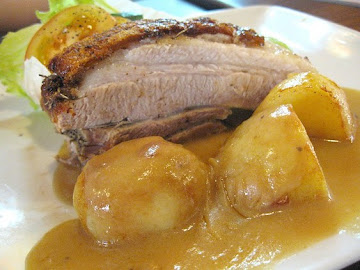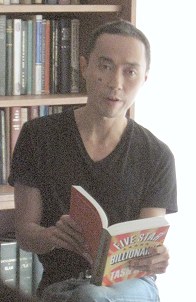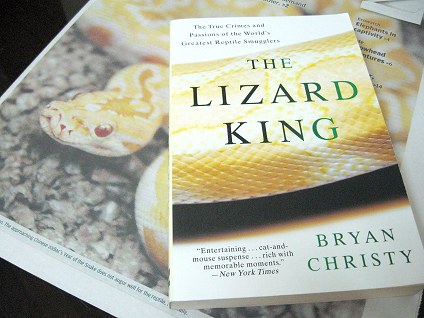I didn't spend time dismantling the logic and history. Avoiding other reviews while I wrote my own as tough; the bandwagon's pretty big and easy to get into. But I guess that, considering the size and hard cover, it sufficed as light reading.
About "symbology" ...
Wikipedia lists the word as "a fictional academic discipline of which the character Robert Langdon is a professor." On a list of ten mistakes and oversimplifications in the book over at The Daily Beast, the word is "nonsensical".
So I used that article's 'correct' word for Langdon's occupation in the review (carelessly wrapping it in square brackets). But didn't some modern 'nonsensical' words become accepted, after being baptised by popular usage - and the Internet?
For now, I guess, it's "iconography" or "semiotics".
Golden Brown
Finger lickin' good Florentine fun from the Colonel Sanders of the genrefirst published in The Malaysian Insider, 04 June 2013
Would you believe that this is the first time I've read any of Dan Brown's books?
Until now, I've only followed the news, read the hype and laughed at the brickbats. No way all of that could be true, I thought.
Then a copy hit my table with a thud.
I took just two hours to finish it.
My unfamiliarity with the author's work and the circus precludes me from fact-checking his alleged mistakes and gloss-overs, so I'll leave that to more capable hands.
But I will say this: Dan Brown's Inferno is, thus far, the greatest movie I've ever read.
From what I have gleaned of Brown's books, those who expect a refinement of his style will probably be disappointed. Fans, however, will be glad to know little has changed.
Italian job
After uncovering the secrets of the Freemasons in The Lost Symbol, Harvard professor of art history and iconography Tom Hank— sorry, Robert Langdon wakes up from a nightmare and finds himself in a hospital with stitches in his scalp and absolutely no clue how he got there.
After speaking to the "tall and lissome" and (one assumes) attractive Dr Sienna Brooks, Langdon, thinking he's still in the States, looks out the window and sees the Palazzo Vecchio — and learns that he's not quite in Massachusetts anymore.
Outside, a female assassin waits. Five miles off Italy's coast, her boss, a man Brown simply calls "the provost", waits for good news in a mysterious US$300 million (RM929 million) yacht and floating military command centre.
Nothing like that is forthcoming. But the provost isn't the only one having a bad day.
After fleeing another assassination attempt, Langdon learns that the willowy Sienna is not only a mutant but a former child prodigy with an IQ higher than Stephen Hawking's. He also finds that he's in possession of a biohazard canister.
Soon, armed men come a-knocking shortly after he calls the US embassy. With Sienna in tow, the inevitable chase begins as Langdon tries to remember what happened in the past couple of days — and unravel a madman's dastardly plot, partly inspired by Florentine poet Dante Alighieri's Divine Comedy.
To add to his list of "?!"-punctuated what-the-hecks, security cameras caught him "stealing" Dante's death-mask hours before he woke up in the hospital.
Nothing like having both sides of the law snapping at one's Somerset-clad heels to add excitement to a bit of historical forensics.
Abandon all prejudice, ye who read this
As the pages turned quickly, I began to see the appeal of novels like this. Cleverly written with hooks and cliffhangers at the end of each short chapter, you just can't put this 460-odd-page novel down until you're done with it.
The only other time I've experienced this compulsion to finish something was at a KFC outlet — or when I opened up a bag of Cheezels I bought last week.
You don't care that it's not literary writing. You learn to skip the piles of exposition and slipped-in trivia, obviously for the benefit of those who can't access their smartphones for some impromptu Googling. I saw less of the groan-worthy similes Brown's famous for; maybe I learned to skip those, too. The expository parts do mess up the flow of the story, like annoying pop-up ads.
Some of the descriptive passages, however, are written in such vivid detail one is compelled to actually fly there to see, for instance, the cringe-inducing "penile grip" featured in the sculpture of Hercules and Diomedes in the Hall of the Five Hundred, or the "intimidating array" of male nudes at the Palazzo Vecchio. Then, there's the superb copywriting on the Church of Dante.
All bound to reinforce the faith Florence's city officials have in Brown's apparent ability to revive flagging tourism industries.
Tripping over trivia
It's not all tourist spots and history. At one point the Harvard dreamboat shares some esoteric knowledge: "Regular gesso smells like chalk. Wet dog is acrylic gesso."
We also get a brief dissertation on the science of denial, along with aphorisms such as, "In the world of book publishing, late-night emergencies were as rare as overnight success." (Shouldn't it be "are"? Is the book publishing industry past tense?)
As well as an endorsement for the iPhone — and e-books. "I've got to stop being such a snob about leather-bound books... E-books do have their moments."
The wit and writing is sophomoric, the preachy bits on human folly are tedious, and the denouement might elicit a huge WTF, even among ardent Brownians.
And there is next to no chemistry between Hank-er, Langdon and the willowy tagalong Sienna. The mistakes she made, for someone of her superb IQ, is conveniently covered by her traumatic past.
Still, Inferno is a pretty solid potboiler that will have you hooked right until the last page.
Inferno
Dan BrownDoubleday (May 2013)
463 pages
Fiction
ISBN: 978-0-385-53785-8
Categories:
Book Reviews,
The Malaysian Insider






























